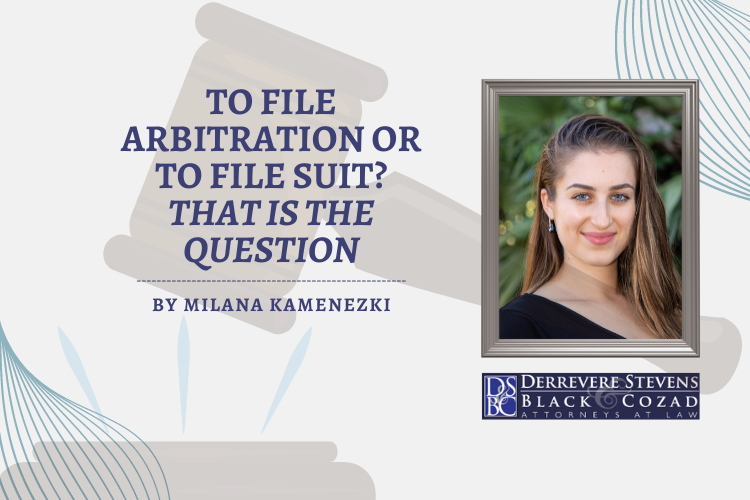To File Arbitration or To File Suit? That is the Question

Background
Arbitration Forums, Inc. (“AF”) was founded in 1943 and is a membership-driven, not-for-profit organization. Many insurers are signatories to agreements that provide for arbitration. This means that the insurers agree to submit any applicable claim that may arise between them to AF and agree to forego litigation.
AF is the nation’s largest arbitration and subrogation services provider. Annually, its members file over 949,000 arbitration disputes and almost 1.7 million subrogation demands, collectively worth over $13.9 billion in claims.
Compulsory Jurisdiction
Section 1-3 of the AF Rules provides that compulsory arbitration is applicable to a maximum of $100,000.00 company claim amount (total company-paid damages) in the Automobile, Medical Payment, Property and Uninsured Motorists Forums. Two of the main forums that we typically submit claims to are:
- Automobile Forum: This forum covers all automobile property damage claims arising from the payment of losses to an insured, or a self-insured loss, under the first party automobile coverages. It includes claims arising under collision, fire, theft, and comprehensive coverages or self-insured losses of a similar nature.
- Property Forum: This forum covers all disputes that members must arbitrate to resolve personal or commercial property claims. Commercial property includes losses by businesses, institutions, and other organizations. These losses can originate from all types of perils, and the coverage forms can be many types. These might involve inland marine, transportation, and traditional fixed coverage forms. Personal property is coverage for individuals and can take the form of many different types just like commercial property. The disputes may concern liability, damages, or both.
Exclusions to Compulsory Arbitration:

It is important to note that product liability claims arising from an alleged defective product are not compulsory in the Property Program per exclusion (i). However, this does not mean that signatory member companies cannot voluntarily agree to arbitrate a claim. The claim can also exceed the forum’s monetary limit if both parties provide written consent. Of note is that once the companies provide written consent to arbitrate a dispute, all Articles and Rules of the respective forum are binding, and the company may not revoke its consent.
Hearing Attendance at Arbitration:

The parties must electronically upload their contentions and associated exhibits. The arbitrator(s) will review the evidence prior to the hearing. At the hearing, the arbitrator can ask any questions s/he may have. As such, the hearing does not last long if no additional information or clarification is needed by the arbitrator(s).
If an insured/witness/expert would like to appear for the hearing, they may of course do so, but they are not allowed to present verbal testimony. Therefore, a written statement from the witness is usually preferable.
Advantages to Arbitration
Intercompany arbitration is designed to be expeditious, easy, and cost-effective. For this reason, AF members typically opt to have cases heard by file only. The written contentions and exhibits are to “speak for itself.”
As such, disputes submitted to AF are resolved much sooner than litigation. The time it takes from filing your case to hearing your case is usually less than 90 days. Likewise, a binding decision is usually made within a few weeks from the hearing date, so the dispute is resolved at a fraction of the time in AF compared to litigation. As a result, arbitration is significantly less expensive. There are no court costs or legal fees. The current fee schedule is available on AF’s Web site (www.arbfile.org).
The arbitration decision is also final and binding without the right of rehearing or appeal except when allowed under the Procedure Section of the Property and Special Forum rules. Therefore, the decision provides finality and marks the end of the dispute.
Disadvantages to Arbitration
Complex disputes may require the level of scrutiny that is available to them only at litigation. For instance, litigation allows for a broad range of discovery in order to gather more information from the opposing side, such as propounding written discovery requests, taking depositions, and requiring expert participation.
Conversely, for AF, while evidence is electronically uploaded and can be viewed online for arbitration, only the submitting party, the assigned arbitrator(s) and AF staff can view it. The adverse party cannot (With the exception of Auto supplemental filings (See Rule 5-3)). Therefore, it is difficult to scrutinize and rebut the adverse party’s position without having an opportunity to view their evidence. Furthermore, AF does not require certain documents to be uploaded and documents can be omitted if chosen, so the “full picture” may not always be disclosed to the assigned arbitrator(s).
Additionally, certain evidence cannot be uploaded as evidence in AF. Regarding audio and video evidence, AF does not currently accept audio or links to external Web sites like YouTube as evidence (evidence containing embedded audio and video is rejected by the Arbitration system). If a party is unable to upload video evidence, it must request a personal appearance and note that there is video evidence to present. In the case of audio evidence (such as recorded statements), AF requires the written transcript of the recording be declared and provided as evidence for the arbitrator to view.
Conclusion
Overall, the answer to the question: To Arbitrate or To File Suit, is surprisingly, it depends. It depends on whether the parties are signatories to compulsory jurisdiction by AF, what the claim amount of the dispute is, what the type of claim is, and whether the parties provide written consent to submit to AF. Nonetheless, arbitration is preferable for the straightforward claims that call for a quick and easy resolution.


